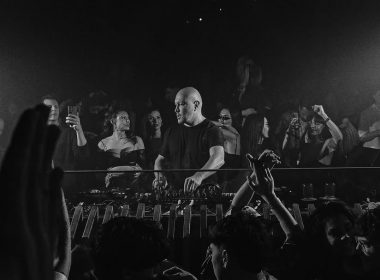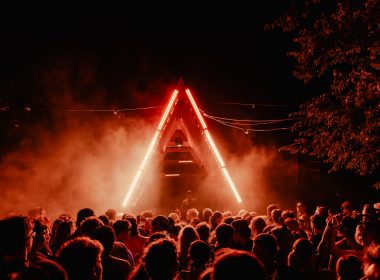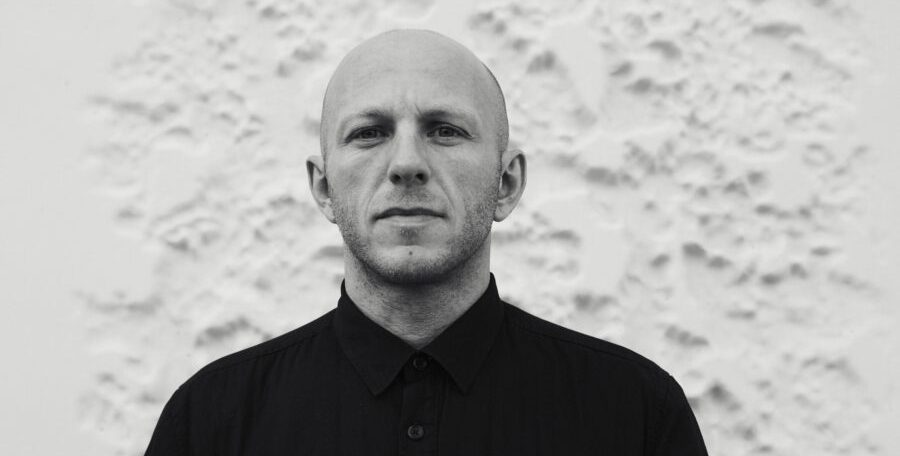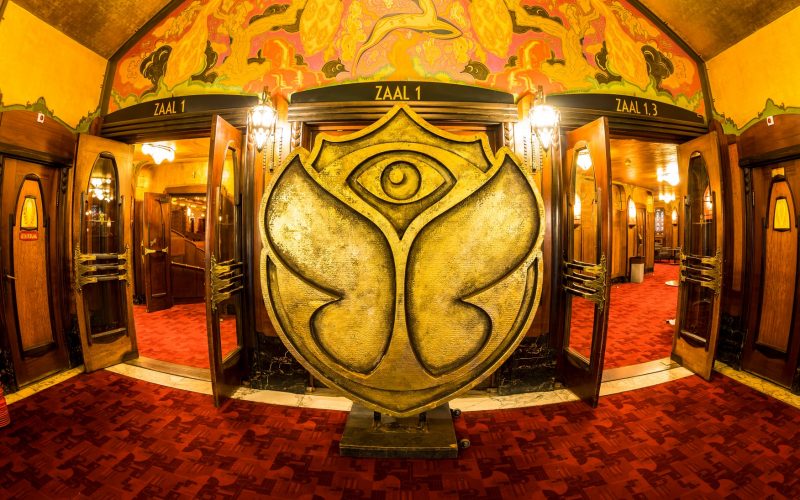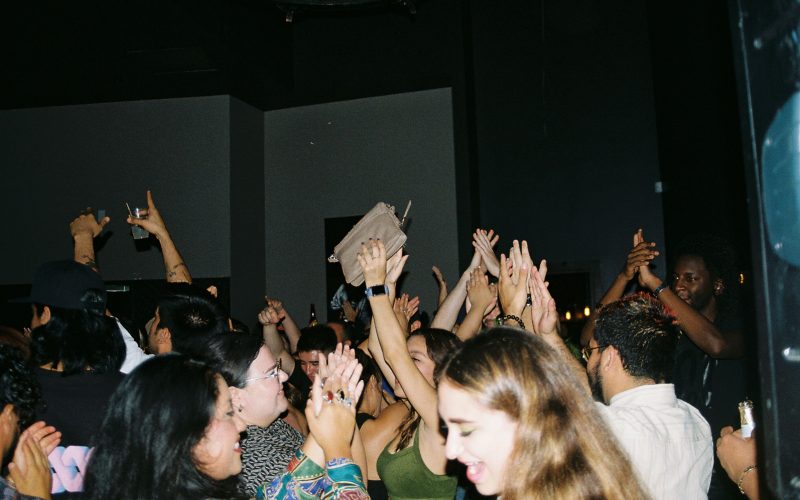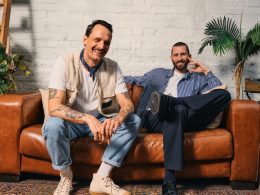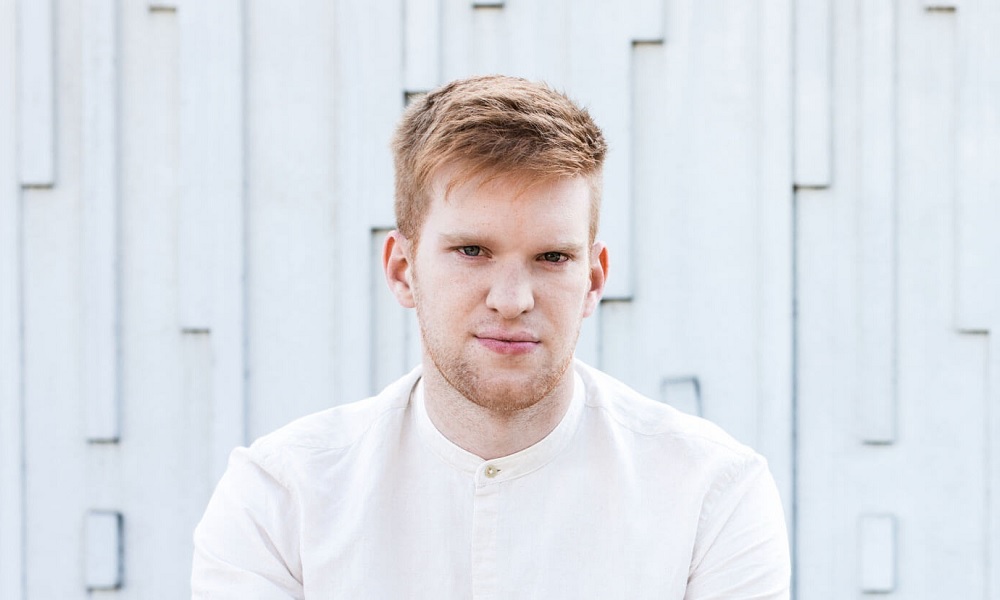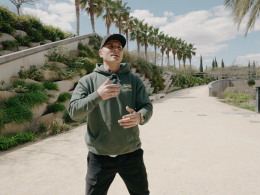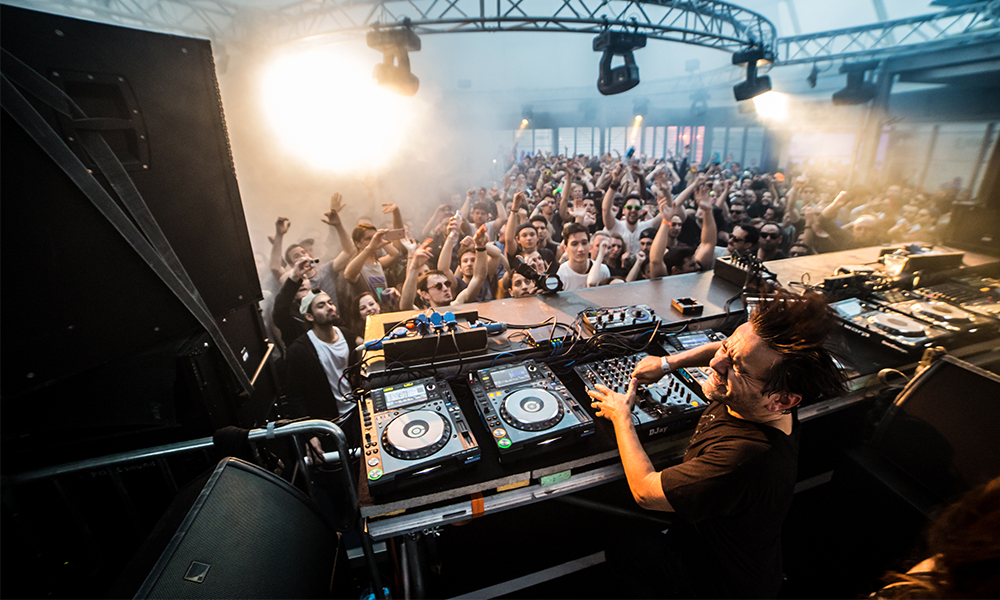A unique and respected vision. A name that echoes from mouth to mouth without introduction. We caught a moment with Zak Khutoretsky, better known as DVS1, at the last Amsterdam Dance Event.
The American maestro, driving force behind the renowned labels HUSH and Mistress Recordings, doesn’t just play techno and dance music—he lives and breathes it. Yet, there’s an ever-present spark of evolution in his work, seen in projects like The Wall of Sound and Aslice. We got the exclusive chance to dive deep into his world—his takes on underground, festivals vs clubbing, and so much more. Read on and press play for the full scoop!
We are here at ADE with Zak, better known as DVS1. How is your ADE looking so far?
Wet. It’s raining too much, but it’s been good. We arrived yesterday and immediately jumped into some interviews. We had the RA Exchange Live yesterday, with really a nice audience and a great moderator with me. I could have talked for a few hours but unfortunately, we had to stop after one.
Some feel that being a producer and a DJ are complementary, but not always intrinsic. What’s your take on this and what would you say are your musts as a producer?
There are not many people who I think are actually capable of mastering, and when I say mastering I mean being really good and spending hours and years perfecting their ability. I grew up as a DJ, I became a producer later. But in the era that I grew up in, you had a very clear separation between those who were DJs and those who were producers, and you could earn a living being both.
The problem nowadays is you almost can’t earn a living being a producer. People who create good music suddenly get shoved into the spotlight of having to perform, and because of technology, maybe they can technically perform. But I think the soul of a DJ and the soul of a producer are usually two separate things. For me as a producer it’s something that, again, it’s just time. I feel confident in how I speak as a DJ. But, I think I need to spend as much time to perfect my ability to speak as a producer. So I think everything comes down to just time, experience, positives, negatives… Trying things and finding what your voice is in whatever way you choose.
Somehow you have stayed on the “healthier” side of technology, with visionary projects such as Aslice. What clicked for you to bet on this concept? Is it going where you expected?
Technology is a gift and a curse. On one hand, technology allows people to cheat or get to places quicker without actually putting in the work, the knowledge, or the understanding. But then on the reverse, technology also gives opportunities to people who maybe never had those opportunities in the past. Maybe somebody really far away can experiment with DJing and producing, and 20 years ago that same person wouldn’t have had any access to drum machines, synthesizers or turntables.
But the negative is, of course, now anyone can be a DJ or a producer and use the presets. And with Aslice, it actually connects to your first question. We’re trying to rebalance the idea that not everyone has to be a DJ. A DJ plays other people’s music, and without music, the dancefloor would be completely silent and we would have nothing to give.
Our hope is that somebody like me who earns money from playing other people’s music, now can give, via technology, an easy button so that we can do something good and pass some of our earnings back down to the producers. I would put us in the category of using technology in a positive way to impact our community and give something back along the process of our success.
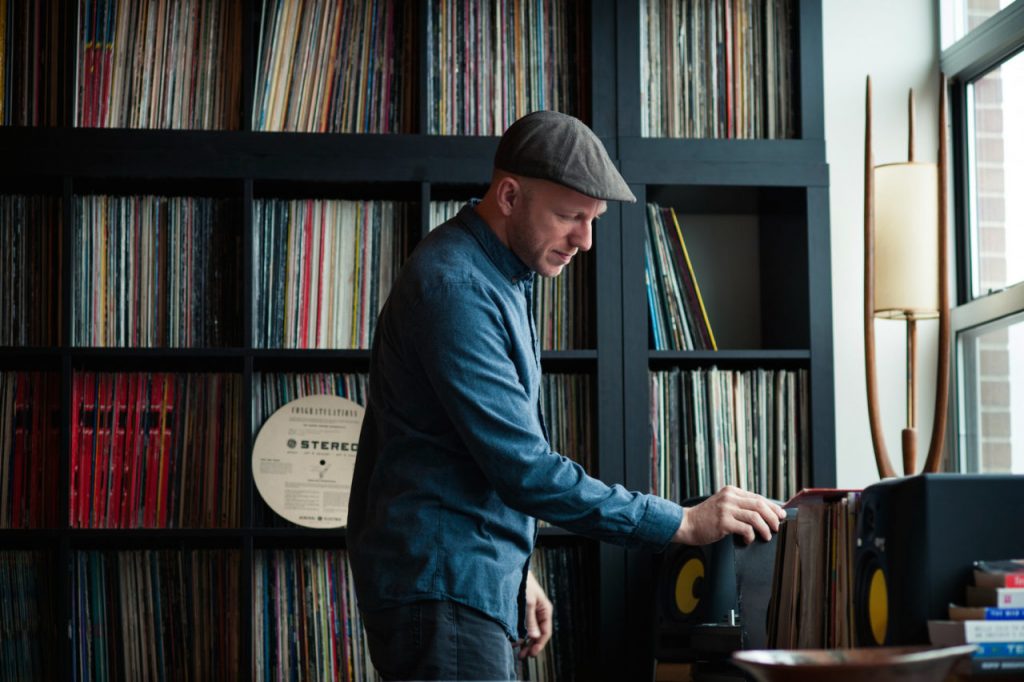
With The Wall of Sound, you kind of reflected your disagreement with the current dance floors and decided to map your own. Could you sense a change in the crowds who witnessed it?
For anyone who doesn’t understand or know what The Wall of Sound is, it’s not even a new concept. It’s me taking a concept that I was raised on. Even before me, somebody else was influenced by probably going back to the dub reggae sound systems where everyone danced to this huge wall of speakers.
The DJ was on the other side of the room or even behind the sound system. The DJ was not the focus, the music was the center and the sound was the way it was delivered and how it felt. Maybe it was just the right moment for me to present this idea again because it was an answer to all the things I think are wrong in our industry right now.
The DJ is just one part in the chain that creates the magic of the night. The focus should be on the dance floor and not on some figure on a stage throwing heart signs and dancing around like a clown.
– DVS1 for Xceed (2023)
Now, the DJ has become a rock star. The DJ has become the center of the focus. The DJ is on a stage with bright lights and LEDs… And we don’t matter. I mean, yes, we matter, but we are just one part of all the parts in the chain that create the magic of the night. If the goal is to connect everyone and bring everyone together, then the focus should actually be on the dance floor and not on some figure standing on a stage throwing heart signs and dancing around like a clown. They should be focused on the art, the music and the delivery, and people should be focused on each other, the connection of the dance floor and the vibration of the sound.
To try to answer the question you asked: Yes, we noticed the big difference on the dance floor. At first, especially the new generations, they really didn’t know what to do when they didn’t see the DJ. Maybe it took them a few minutes to re-acclimate to their surroundings and think, “But wait, what do I look at? Where do I face? What direction? Where’s my space?”. But then you start to notice people turning around and facing each other and dancing into the speakers. Because really, the people will look wherever the music, the physical sound is coming from. The DJ doesn’t have to be in that location. The DJ could be anywhere.
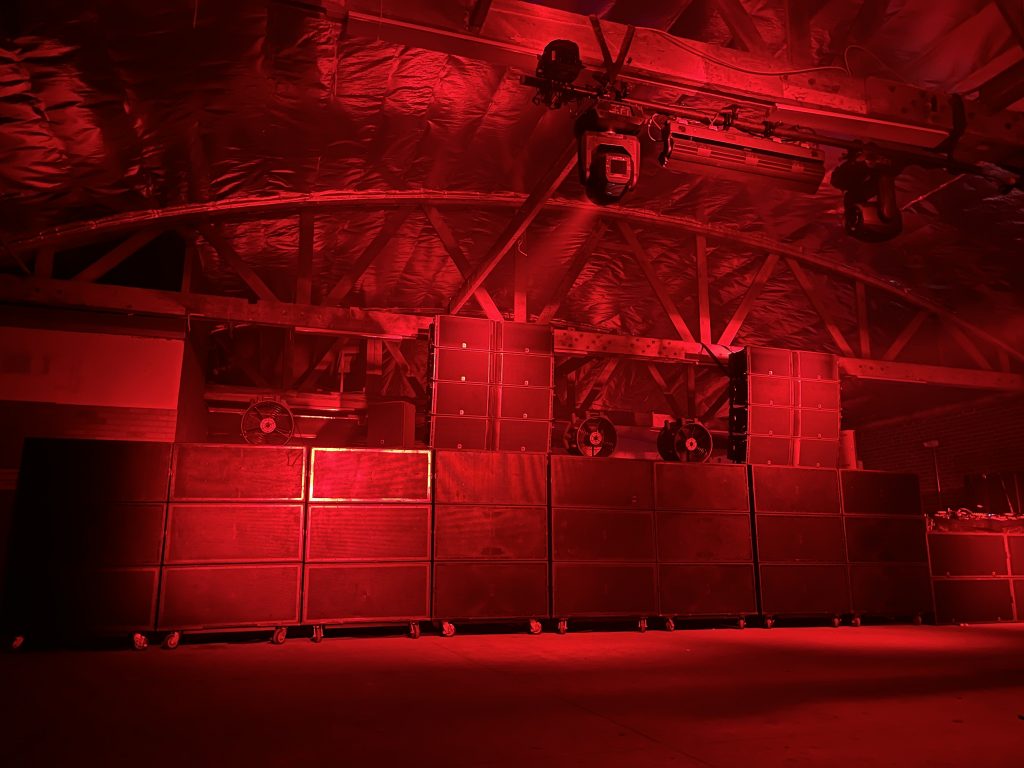
Let’s talk about another controversial topic: festivals. As you are a clubbing person, have you ever reflected on a different concept between a club and a festival that would make you feel fulfilled as an electronic music lover and an artist?
When I came out with my very strong opinion in this video for The School of House a couple of years ago about festivals destroying club culture, it’s not that I said festivals don’t need to exist. I just wanted to make very clear the separation of what a festival creates in our industry and in our community, in terms of short attention spans and short DJ sets, versus a club. Where art is created, where community is created. And people said, “But you still play festivals!”. Of course, I do! Because festivals also take up almost 40% to 50% of our year of music. I just wish there was a healthy balance and I wish artists and the audience would understand a healthy balance between both.
Festivals can be fun: you’re outside, maybe in the summer… But if they destroy the ultimate culture that supports the community, marginalized people, and all these groups that really thrive in the club scene, then the festivals destroy everything we worked so hard for. I just wish there was a healthier balance, one not affecting the other so much, and again the crowd understanding where their money goes, and understanding the value of supporting community and artists, versus just the entertainment of a festival.
What is underground nowadays? Do we need a new era, new artists and genres from scratch to somehow relive the genuineness of the past?
Somebody might look at me and say, “Oh, but you’re so underground!”. And I would argue and say “I’m too successful to be underground anymore”. The differences are that I carry the underground aesthetic, I bring the underground culture and energy that I grew up on and the values to my position of success. Maybe on a commercial level.
I think there are two ways to view it.“The real” underground I don’t even know about, maybe you don’t know about. It is not advertised as openly. It’s what you discover when you live in a city and you meet some people and they say, “Hey, do you want to come to this really cool thing in some small warehouse with 100 people?” That’s the true underground. A lot of times also that’s where some of the most creative energy is made. And then, somebody discovers it in the mainstream and then they bring it there, to the bigger stage.
There will always be an underground in every culture; in art, in food, in music, in everything. The moment somebody with money sees it and wants to make it bigger, it loses maybe a little bit of its credibility. I believe we can bring underground morals and values into something a little bit bigger even if it’s not “underground” by definition anymore, but we value the underground it came from and continue to kind of carry those things.
There will always be an underground in every culture; in art, in food, in music, in everything. The moment somebody with money sees it and wants to make it bigger, it loses a little bit of its credibility.
– DVS1 for Xceed (2023)
To have such certain values as you have, you must have had some battles within yourself. What would you say to newcomers about how to stay true to themselves?
We’re taught in our culture that you start at the bottom and if you work hard, you keep going up, up, up until you’re at the top. Until you’re the boss, until you own the company.
But in art, the top is not always the success. Success comes when you reach a moment of you maintaining freedom as an artist, but you understand that this is the maximum you can handle before you have to make decisions you can’t live with. And for me, luckily, my success happened when I was older, in my 30s, I already know who I am.
When I was faced with “Do you go this way or this way”, it was actually a very easy decision to say “I don’t do this because this would minimize my authenticity as an artist and what I believe in for the money”. That’s a very unique position to be in because, when you’re starting, you think everything is an opportunity and every offer of money means success. But it doesn’t.
I think as artists you have to know when to say “That’s enough because here I can still maintain my art, but I can survive from it”. I always tell new artists to not quit their day job, because their day job and the money that they earn gives them the freedom to be an artist. Don’t just try to be an artist, because then you’re faced with decisions that maybe will challenge your view of art.
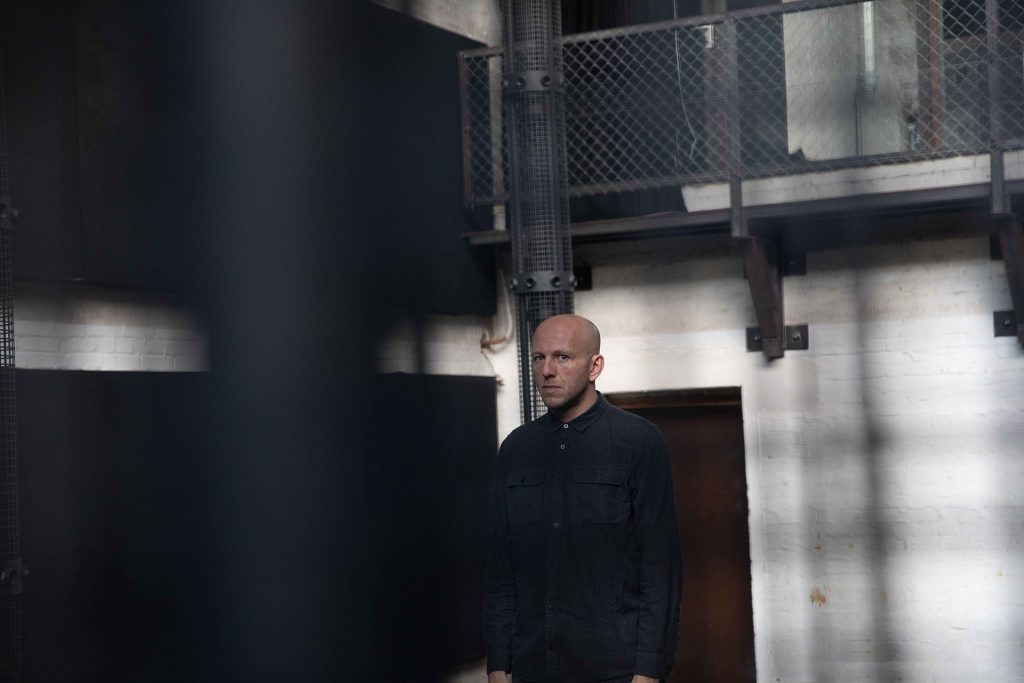
Some parts of the techno scene are fading in new generations and they’re heading to artists like you. Trying to find something purer, more underground… What if you unintentionally became the rock star that you always talk about, without even trying?
If you’re defining the rock star as the person other people look up to, then I’m happy to be that “rockstar”. To me, a rock star is a person who stands on a stage and thinks the world revolves around them. I realize that I’m in this position because of everyone around me. And yes, my art, my ability, and my skill are one thing. But the people who support me, the people who buy the tickets, the people who clean the bathroom at the warehouse where I’m playing. They’re also a part of my success on that night. I realize that it’s not just about me.
Yesterday in the exchange that we did, somebody asked me, “Look, I’m young. Everything around me is kind of representing a version of techno that I’m not interested in. How do I represent what I’m interested in?” And I said, “Don’t try to change the people that are already going in a direction you’re not interested in. Instead, spend your time finding the people who feel like you, who want what you want, and have allies”.
Because of what I’ve done over the years, I’m independent. But I can go out in the world and I can see who the allies are and who the people are, who I think share similar values. In the end, we connect, we support each other. And when I want to find people who are like-minded, I only have to look in those directions. I don’t care to convince somebody going here or there to join me. I don’t need to. I just need to find the people who are going in a similar direction to me and make sure that we’re all connected somehow.
This hard, fast techno is the EDM of this generation. But they’re dressed in an underground way. Everyone thinks that it’s underground music, but it’s not.
– DVS1 for Xceed (2023)
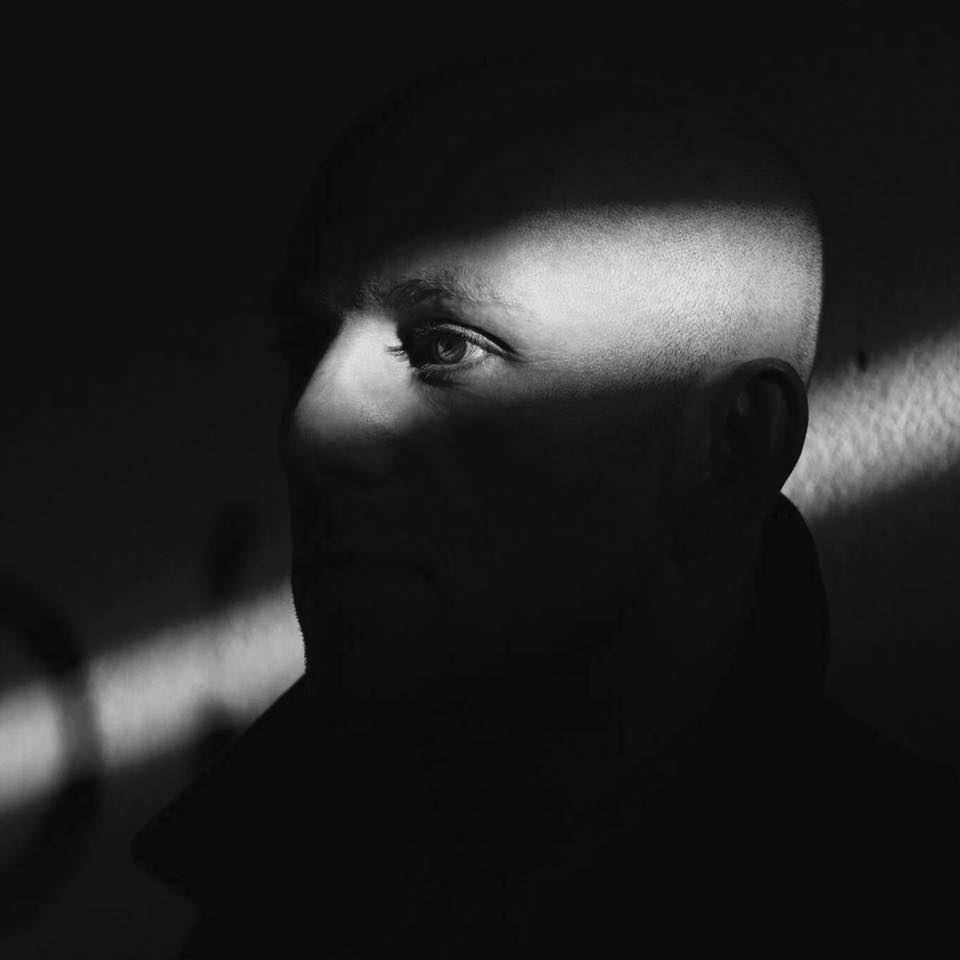
You have a very unique vision of electronic music. Nowadays, with everything that’s going on with hard techno, once you experience it you might think there’s no soul in it. And if you look for something else, something you can feel attached to, that’s when you start noticing artists like you.
For a lot of kids, let’s say in the US, when all this really terrible EDM music was popular 10-15 years ago, that was the gateway to finding better music for some of these people. But that was their introduction to the music right now. This hard, fast techno is the EDM of this generation. But they’re dressed in an underground way.
Everyone thinks that it’s underground music, but it’s not. It’s EDM, It’s actually pop techno, and it’s the gateway. I always said, “I don’t care that it exists. I just wish people would stop comparing it to techno, because it’s not”. This is not an ego thing. It’s just that I think that what I do and the music I come from, that’s pure underground, true techno. This stuff is the door to open to find this. I tell people, “Just grow, wait a few more years, go to a few more club nights where it’s 15 hours of this boom, boom, boom”. From the moment the doors open, you get tired, and you start looking for something else.
It’s cool it exists, but maybe 5-10% of those people will start looking for something different, deeper, more soulful, something more, you know, real. And they’ll find their way, you know? It’s OK that it exists. Just don’t put us in the same category.



